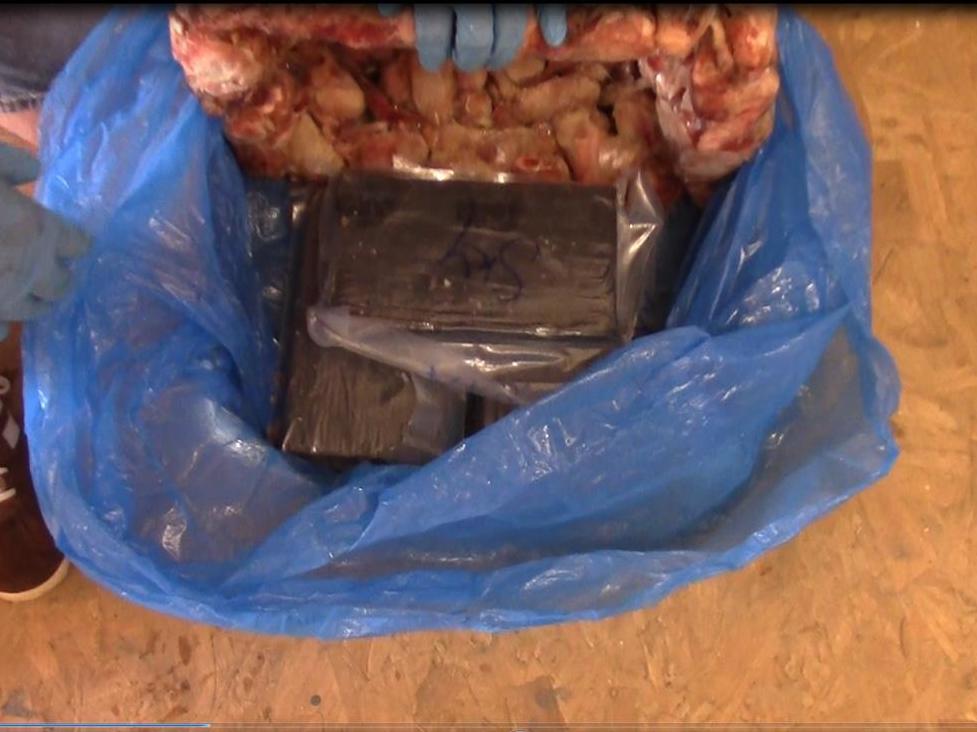Gang who smuggled hundreds of kilos of cocaine into UK inside frozen chicken jailed
Men set up meat importing company as cover for illicit trade

Four men who smuggled hundreds of kilos of cocaine into the UK hidden inside packages of frozen chicken have been jailed.
Ringleader Thomas Lordan, 38, set up a company called Independent Meat Ltd as a front for the illicit imports in May last year.
But police and National Crime Agency (NCA) spotted accomplices Francis Sullivan and Emanuel Jella exchanging a holdall packed with 11kg of cocaine in the Kent village of Shadoxhurst the following month.
Jella was arrested but Sullivan managed to flee, and an investigation revealed they were part of a wider criminal network.
Co-conspirator Mehmet Ali was found transporting 55kg of cocaine on an industrial estate in Lympne, Kent, in August.
A few hours after he was arrested, Lordan bought a one way flight to Turkey and fled the country.
Sullivan was arrested on 24 September at his home, where officers also seized £32,000 cash, scales, and cocaine.
Lordan was eventually apprehended on a European Arrest Warrant by Dutch police at Amsterdam airport on 14 January. He was later extradited to the UK.
NCA operations manager Matt McMillan said: “This seizure of a significant amount of cocaine means it hasn’t ended up on the streets, fuelling violence and exploitation. We have dismantled a well-established drug supply route.
“Lordan provided the logistics with Sullivan and Ali acting as trusted lieutenants. They used a front company in an effort to disguise their criminality, thinking they could evade capture. But, as this case shows, if you engage in drug trafficking you will be caught.”
Det Ch Insp Tony O’Sullivan, of the Metropolitan Police, said the joint operation had “massively disrupted a major drugs network operating in London and Kent”.

“It is important to remember the strong link between drugs and violence and by removing this amount of cocaine from the market we have undoubtedly prevented incidents of serious violence and potentially saved lives,” he added.
“Even during these challenging times, we will continue to target those involved in organised crime and the supply of illegal drugs and we will take robust action against them.”
All five members of the country admitted conspiracy to supply class A drugs and were jailed for a combined total of 50 years.
Appearing at Lewes Crown Court on Thursday, Lordan, of Hurst Road in Sidcup, was sentenced to 18 years imprisonment, Ali, 62, of Ministry Way in Eltham to 15-and-a-half years and Sullivan, 22, of Clayhill Crescent in Mottingham to 10 years. Jella, 20, of Chatham Road in Kingston, was previously jailed to six years and seven months for the same offence at Southwark Crown Court.
Police and the Border Force have seized huge amounts of cocaine and other drugs during the coronavirus lockdown, which has made importing and transporting illicit goods more difficult.
There are concerns that supply issues and rising prices could make violent competition between dealers more severe, although violent crime has fallen significantly since restrictions came into force.
Metropolitan Police commissioner Cressida Dick is among the officers voicing hope that gains made against gangs can be maintained.
Speaking at a press conference last week, she warned that the demand for drugs had not gone away but said: “We are absolutely determined to bear down on violence and prevent an escalation anywhere near back to previous levels.”
Officials previously revealed that drug dealers were faking NHS badges and disguising themselves as key workers to avoid police.
A webinar on the impact of coronavirus held by the Royal United Services Institute (RUSI) think-tank last week heard that drug markets had been affected around the world.
Senior research fellow Keith Ditcham said crime syndicates were facing an “existential crisis” in Latin America after the US closed its border with Mexico and required chemicals stopped arriving from China.
“It has led to turf wars by rival groups fighting over the scant criminal opportunities,” he added.
Mr Ditcham said that aviation and shipping restrictions meant gangs had been forced to send larger quantities of cocaine in single loads that were more at risk of being seized before reaching their target markets in Europe.
Bookmark popover
Removed from bookmarks